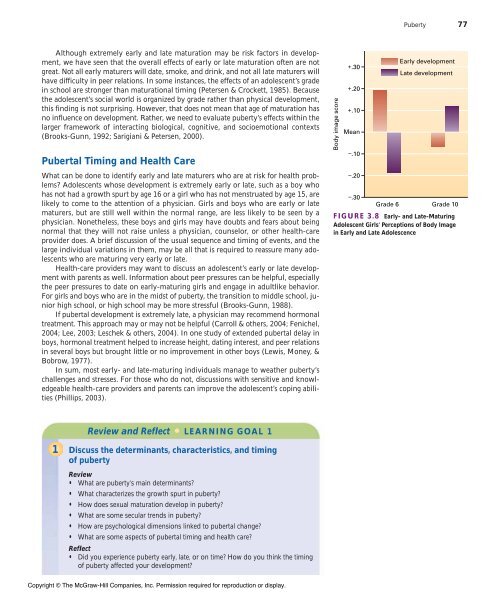Chapter 3 Puberty and Biological Foundations - The McGraw-Hill ...
Chapter 3 Puberty and Biological Foundations - The McGraw-Hill ...
Chapter 3 Puberty and Biological Foundations - The McGraw-Hill ...
Create successful ePaper yourself
Turn your PDF publications into a flip-book with our unique Google optimized e-Paper software.
Although extremely early <strong>and</strong> late maturation may be risk factors in development,<br />
we have seen that the overall effects of early or late maturation often are not<br />
great. Not all early maturers will date, smoke, <strong>and</strong> drink, <strong>and</strong> not all late maturers will<br />
have difficulty in peer relations. In some instances, the effects of an adolescent’s grade<br />
in school are stronger than maturational timing (Petersen & Crockett, 1985). Because<br />
the adolescent’s social world is organized by grade rather than physical development,<br />
this finding is not surprising. However, that does not mean that age of maturation has<br />
no influence on development. Rather, we need to evaluate puberty’s effects within the<br />
larger framework of interacting biological, cognitive, <strong>and</strong> socioemotional contexts<br />
(Brooks-Gunn, 1992; Sarigiani & Petersen, 2000).<br />
Pubertal Timing <strong>and</strong> Health Care<br />
What can be done to identify early <strong>and</strong> late maturers who are at risk for health problems?<br />
Adolescents whose development is extremely early or late, such as a boy who<br />
has not had a growth spurt by age 16 or a girl who has not menstruated by age 15, are<br />
likely to come to the attention of a physician. Girls <strong>and</strong> boys who are early or late<br />
maturers, but are still well within the normal range, are less likely to be seen by a<br />
physician. Nonetheless, these boys <strong>and</strong> girls may have doubts <strong>and</strong> fears about being<br />
normal that they will not raise unless a physician, counselor, or other health-care<br />
provider does. A brief discussion of the usual sequence <strong>and</strong> timing of events, <strong>and</strong> the<br />
large individual variations in them, may be all that is required to reassure many adolescents<br />
who are maturing very early or late.<br />
Health-care providers may want to discuss an adolescent’s early or late development<br />
with parents as well. Information about peer pressures can be helpful, especially<br />
the peer pressures to date on early-maturing girls <strong>and</strong> engage in adultlike behavior.<br />
For girls <strong>and</strong> boys who are in the midst of puberty, the transition to middle school, junior<br />
high school, or high school may be more stressful (Brooks-Gunn, 1988).<br />
If pubertal development is extremely late, a physician may recommend hormonal<br />
treatment. This approach may or may not be helpful (Carroll & others, 2004; Fenichel,<br />
2004; Lee, 2003; Leschek & others, 2004). In one study of extended pubertal delay in<br />
boys, hormonal treatment helped to increase height, dating interest, <strong>and</strong> peer relations<br />
in several boys but brought little or no improvement in other boys (Lewis, Money, &<br />
Bobrow, 1977).<br />
In sum, most early- <strong>and</strong> late-maturing individuals manage to weather puberty’s<br />
challenges <strong>and</strong> stresses. For those who do not, discussions with sensitive <strong>and</strong> knowledgeable<br />
health-care providers <strong>and</strong> parents can improve the adolescent’s coping abilities<br />
(Phillips, 2003).<br />
1<br />
Review <strong>and</strong> Reflect ● LEARNING GOAL 1<br />
Discuss the determinants, characteristics, <strong>and</strong> timing<br />
of puberty<br />
Review<br />
• What are puberty’s main determinants?<br />
• What characterizes the growth spurt in puberty?<br />
• How does sexual maturation develop in puberty?<br />
• What are some secular trends in puberty?<br />
• How are psychological dimensions linked to pubertal change?<br />
• What are some aspects of pubertal timing <strong>and</strong> health care?<br />
Reflect<br />
• Did you experience puberty early, late, or on time? How do you think the timing<br />
of puberty affected your development?<br />
Copyright © <strong>The</strong> <strong>McGraw</strong>-<strong>Hill</strong> Companies, Inc. Permission required for reproduction or display.<br />
Body image score<br />
+.30<br />
+.20<br />
+.10<br />
Mean<br />
–.10<br />
–.20<br />
–.30<br />
<strong>Puberty</strong> 77<br />
Early development<br />
Late development<br />
Grade 6 Grade 10<br />
FIGURE 3.8 Early- <strong>and</strong> Late-Maturing<br />
Adolescent Girls’ Perceptions of Body Image<br />
in Early <strong>and</strong> Late Adolescence

















